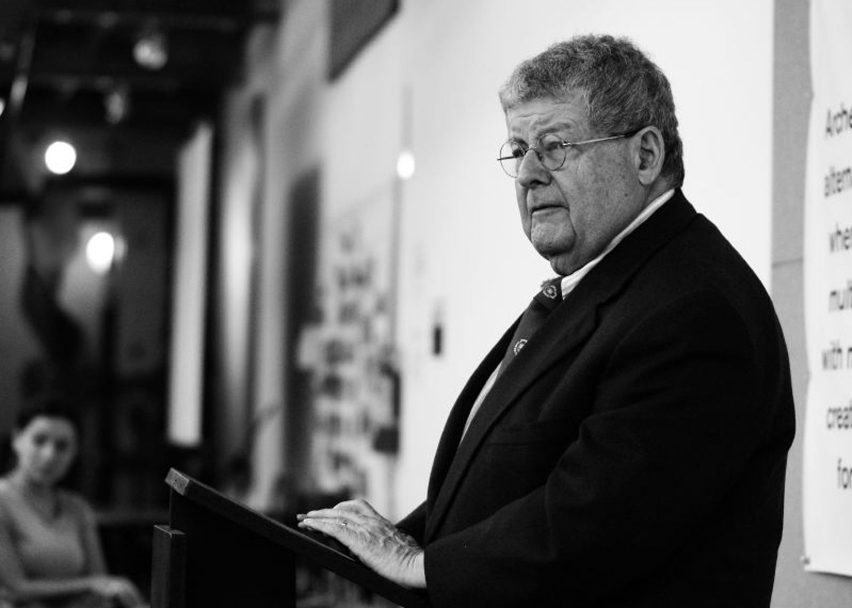
Stanley Tigerman "giant of our time" dies aged 88
Chicago architect Stanley Tigerman, a founding member of the rebellious postmodern architecture group Chicago Seven, has passed away aged 88.
Tigerman died yesterday following a battle with chronic obstructive pulmonary disease, his wife and partner Margaret McCurry told Architect Magazine.
The architect was among the seven founding members of the Chicago Seven, along with Larry Booth, Stuart Cohen, Ben Weese, James Ingo Freed, Tom Beeby and James L Nagle. Established in 1976, the postmodern group rebelled against the modern architectural movement influenced by architect Mies van der Rohe, which was prevalent in the city.
In a backlash against pared-back modernism, Tigerman and his peers designed in a more decorative fashion that drew on historical influences. Among examples of these are Tigerman's Anti-Cruelty Animal Shelter in the city's River North neighbourhood, which he completed in 1981 with a playfully punctured facade.
"A man of wit, warmth, earnestness and passion"
Members of the architecture and design community have taken to social media to pay tribute to the architect, including writer and critic Paul Goldberger who described him as a "giant of our time in architecture".
"Stanley Tigerman, a man of wit, warmth, earnestness and passion for architecture and for Chicago, and most of all for what the combination of architecture and Chicago could mean for our time," Goldberger tweeted.
Architecture firm SOM, where Tigerman spent a brief time working, also posted condolences on its Twitter account.
"We are deeply saddened to learn of the death of Stanley Tigerman," it said.
"A pillar of the Chicago architecture community and an alumnus of SOM's Chicago office, Tigerman influenced the city's built environment in lasting and meaningful ways," it continued. "He will be greatly missed."
Major buildings constructed in Chicago
Tigerman founded his studio Stanley Tigerman and Associates Ltd, now Tigerman McCurry, in 1964. His earlier projects include the Five Polytechnique Institutes in Bangladesh, which he designed with local architect Muzharul Islam in the 1960s.
He completed over 450 buildings during his career, with a number of major institutional projects in and around the Chicago area. In 2009, he completed the Illinois Holocaust Museum and Education Center in the city's Skokie suburb, where a number of survivors lived.
Tigerman reportedly threw the competition brief for the centre in the bin, but was encouraged to enter by McCurry.
Other examples of his work include the now-demolished Power House energy museum in Zion, which featured a "basilica-like" shape, and the Illinois Regional Library for the Blind and Physically Handicapped, which is fronted by a thick concrete wall "irrationally" punctured by a wave-shaped opening.
Architect retired in 2017
Tigerman retired in 2017 and left his practice to McCurry, his third wife to whom he was married to for 40 years.
The architect was born to a Jewish family in Chicago on 20 September 1930.
He studied at Yale School of Architecture and graduated in 1961. But prior to this, he gained eclectic experience with a brief stint at Massachusetts Institute of Technology, the US Navy, and working for a short while at SOM.
Accolades he has received over the years include the Association of Collegiate Schools of Architecture's (AIA/ACSA) Topaz Medallion for Excellence in Architectural Education in 2008, the AIA Illinois Gold Medal in recognition of outstanding lifetime service and the AIA Chicago Lifetime Achievement Award in 2013.
He served as the director of the School of Architecture at the University of Illinois at Chicago from 1985 until 1993 and founded Archeworks, a nonprofit alternative design school, with designer Eva L Maddox in 1994.
Photograph of Stanley Tigerman is by Flickr user ChicagoEye and has been cropped.